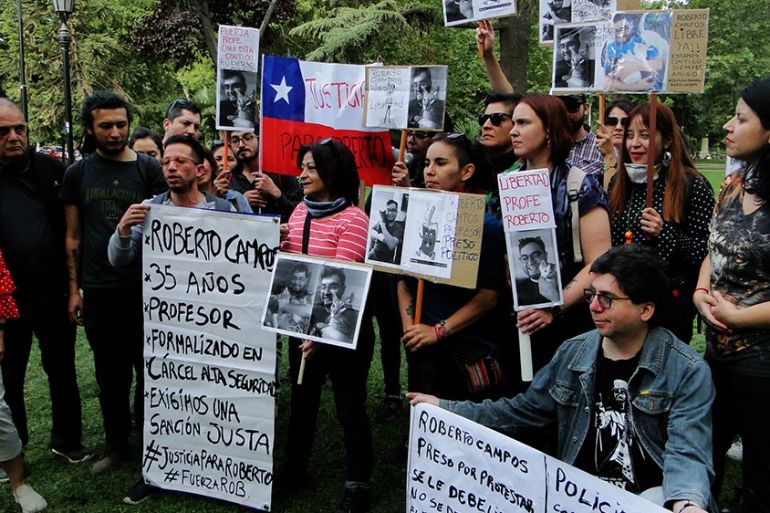Why Chile protesters say state security law criminalises protests
Roberto Campos Weiss faces up to 10 years in jail under controversial state security law for hitting a subway turnstile.

Santiago, Chile – Mathematics professor Roberto Campos Weiss does not dispute he participated in a protest against a subway fare increase in Chile, nor does he dispute that he hit an already damaged turnstile. That is on video.
But what Campos and his supporters do reject is the accusation that the 35-year-old instigated the vandalism that occurred on October 17 in Chile’s San Joaquin metro station, Campos’s now month and a half long preventive detention in a high-security prison and the controversial law used to keep him there.
Keep reading
list of 3 itemsLaurin
Chile opposition files ‘constitutional accusation’ against Pinera
“He risks up to five to 10 years in jail for breaking a metro turnstile” Campos’s partner, Armando Arjon, said on Friday outside the prison where the professor is being held.
The metro protests are widely considered to be the spark that led to the country’s continuing social unrest. The destruction of the turnstiles occurred during protests against a now-scrapped metro fare increase, initially organised by groups of high school students who jumped the turnstiles during rush hours. The protests, supported by thousands of Chileans, have since mushroomed into nearly two months of anger over growing inequality and the government crackdown on the demonstrations.
“The prosecutors said that, as he was a teacher, he had access to malleable young minds and was a danger to society. What evidence is there for that?” Arjon said.
Campos shared the anger that Chileans have expressed since the movement began, Arjon added. He had struggled to pay back his student debt and was supportive of the metro protests, “he agreed with what the students were saying about the high cost of living”.
According to Arjon, his partner encountered the protesting students on his way home from tutoring in the San Joaquin neighbourhood of Santiago.

A video of the incident shared on social media and used as evidence by prosecutors shows a masked man smashing the machines, destroying them as a crowd of students applaud. Campos enters the shot and hits one of the battered installations. He then lifts his hands, joining the cheers by the crowd.
“What we have here is destruction – the destruction of the life of every person who used the common good such as a metro that has taken generations to build,” said the prosecution during Campos’s indictment on October 30.
Arjon believes his partner’s case has been used by the state to warn Chileans about the possibility of arrest for their participation in protests.
“The prosecution need a face to blame, a scapegoat. Roberto is a normal citizen, he has no criminal record,” Arjon said.
Controversial state security law
Campos is being held under a controversial state security law, the first protester detained under the law since the unrest began.
Written in the 1950s, the law underwent several reforms during the 1973-1990 Pinochet dictatorship, which widened the circumstances for its application. It has not been commonly applied since Chile’s return to democracy nearly 30 years ago.
But following the recent unrest, Chilean President Sebastian Pinera warned that the law would be used against those who “incited, organised or participated” in actions that have “caused damage to so many people”.
“Destroying everything is not a form of protest, it is a crime,” he reportedly said.

Officials estimate that there has been at least $1.5bn worth of destruction since the protests began.
Under its current use, those convicted with charges related to the law can face up to 10 years in prison. The government has reportedly confirmed at least 78 cases being investigated related to state security charges including vandalism and violence.
Public prosecutors claim that Campos is responsible for inciting the vandalism at the metro station and causing more than $25,000 of damage.
Some Chileans, wary of the ongoing disorder, agree with the use of the law against those who use vandalism as a means protest.
According to Jose Luis Correa, a criminal defence lawyer, however, the law does not outline what specific acts can be investigated under the law, but only refers to any type of action that could put public safety at risk.
”Roberto
are saying, this is what could happen to all of you.”]
Without the law, Correa said, Campos would likely be charged with a “common” crime, which would carry a substantially lighter sentence – possibly a fine or public apology.
“It generates fear – people think ‘I won’t go to the march because what happened to him could happen to me’,” Correa told Al Jazeera.
“It’s a way to criminalise the social protests,” he added. “Roberto is a symbol. They are saying, this is what could happen to all of you.”
But since his arrest, Campos has become a different symbol for protesters across Santiago, who demand his release.
Last week, dozens marched outside the prison where the teacher is being held, chanting in Spanish, “Roberto is present, destroying a turnstile is not a crime.”
One protester held a sign that read: “State Security Law for breaking a turnstile. Freedom for Roberto NOW!”
Graffiti that demand Campos’s freedom can be seen on walls throughout the city.
“It’s absurd they are placing a weight on him for the whole social revolt that’s happening because people are tired of social injustice in the country” said Kika Valdes, Campos’s cousin.
“Roberto isn’t part of any organisation or union, he’s not political or linked to any causes other than animal-related ones,” she told Al Jazeera. “It’s unjust, they have him in there like a trophy. It’s so unjust.”
Campos will be held in custody while the investigation continues, which could last until early next year. Four appeals against his detention have been denied in courts. A final appeal was reportedly rejected by the Supreme Court on Tuesday.
“My son is not a threat to society, he should only be under house arrest,” said Camila Weiss Flores, Campos’s mother, who is able to visit her son twice a week.
“He’s good-natured, an animal lover, likes to be at home with friends. He’s never been involved in anything like this before,” she told Al Jazeera.
And for Arjon, Campos’s case is about more than his partner.
“Roberto is just a normal citizen who said, ‘enough is enough,'” says Arjon. “He could be any one of us, and we could all be him.”